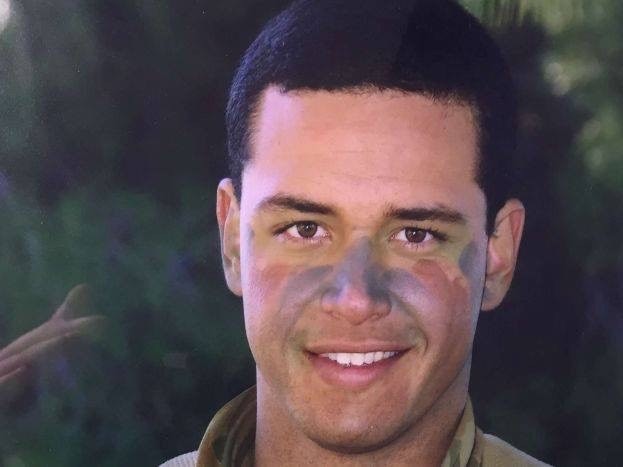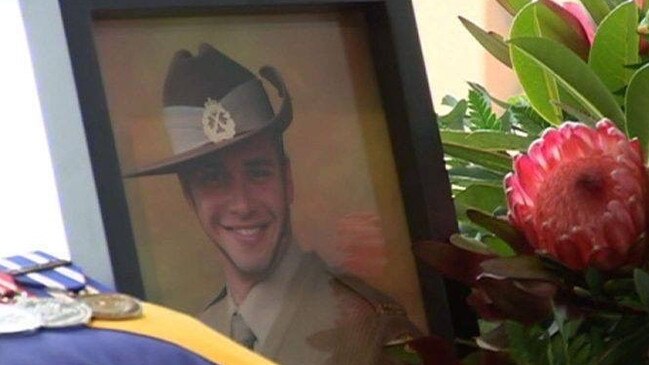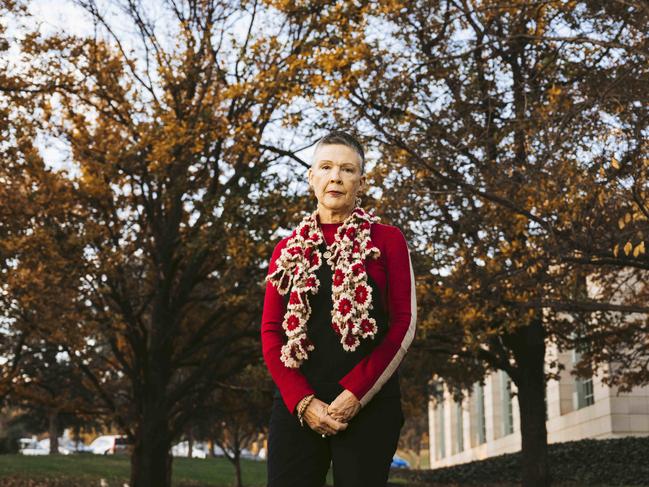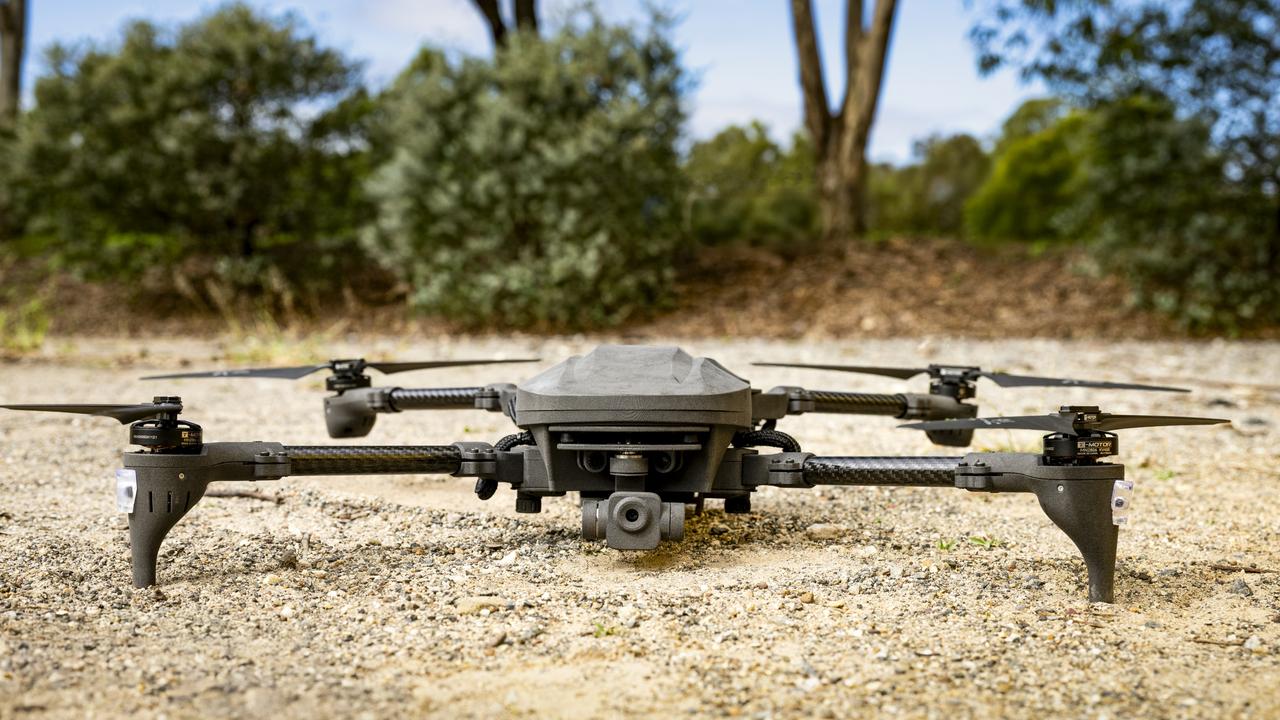Australian War Memorial to honour the veterans we lost to suicide
For years, there has been a missing conversation about the long-term cost of war on Australian families. Now there is finally a place where we can honour those who have experienced trauma from military service.

A mother loses her veteran son not to war, but to suicide. Where does she go to grieve?
Not, before now, to the Australian War Memorial.
It has monuments for soldiers killed in battle, but there is no place for those who wish to commemorate the thousands of veterans, tormented by their experiences, who have taken their own lives upon returning home from battle.
That will soon change, with Veterans’ Affairs Minister Darren Chester on Wednesday announcing a new and very special sculpture to be installed at the Australian War Memorial.
The artwork, called For Every Drop Shed in Anguish, will be for all those who have experienced trauma from military service; for those who have watched family members suffer; and for visitors to reflect on the experience of a mind at war with itself.

Karen Bird, whose son Jesse Stephen Bird, 32, took his own life upon returning from Afghanistan, told The Australian that the discussion about a memorial “began with one simple question: why can’t a mother, father, wife, husband, partner, brother, sister, relative, friend or stranger take a moment” at the War Memorial to reflect on the service and sacrifices of those who did not die in battle, but afterwards?
“The Australian War Memorial acknowledges those who were killed or died of their physical wounds in the field of war,” she said.
“The missing conversation has always been the war that comes home. This war is, and has always been, just as vicious.”
This new “more honest conversation about the long-term cost of war” has resulted in a government commitment to create a sculpture for those who suffered in war.
“We can speak now of the forgotten and the missing,” said Ms Bird, who will attend the unveiling of the plans on Wednesday.
“I stand here as the proud mother of one such veteran, Jesse Stephen Bird,” she will say in her speech. “I seek to redress this anomaly on his behalf, and on behalf of all those before and after him.”
Mr Chester said he had spoken with many veterans’ families and friends, including those who have lost someone to suicide, about how military service has affected them.
“This project has been driven by the ex-service community, particularly Karen Bird and Connie Boglis,” he said.
A steering committee comprising military historians, parents and others chose local artist Alex Seton, who works with marble, to create the sculpture. It will take two years to craft and will depict a field of sculpted marble droplets in the memorial’s sculpture garden.
“Every droplet has a unique shape, defined by its delicate surface tension,” Seton said.
“Their rounded liquid forms suggest blood, sweat or tears – for every drop ever shed in anguish.
-
A tribute to victims of the silent war
This is an edited extract of a speech to be given by Karen Bird at the Australian War Memorial on Wednesday. Her son, Jesse, took his own life while suffering trauma from service in Afghanistan. The new Sufferings of War and Service sculpture has been commissioned for those who have experienced and witnessed the ongoing trauma that can result from military service; and for memorial visitors to reflect on this experience.

About three years ago, a committee was drawn together to begin an important conversation within the walls of the Australian War Memorial. We began with one simple question: why can’t a mother, father, wife, husband, partner, brother, sister, relative, friend or stranger take a moment to reflect on the experiences and sacrifices of all the men and women who have served and fought for our country at Australia’s dedicated war memorial?
The Australian War Memorial acknowledges those who were killed or died of physical wounds in the field of war. The missing conversation has always been the war that comes home. This war is, and has always been, just as vicious.
This conversation was, and is, painful. It acknowledges the physical and moral cost associated with war and conflict and military service to Australian society. This is a long-term cost, borne in the hearts and minds of our military personnel and, by association, their families, partners and friends. This cost is intergenerational and across time.

We stand here today to recognise the sufferings of war and service and we, the loved ones of these men and women, have made a place for them.
This is part of our new, more honest conversation about the long-term cost of war to this nation. We can speak now of the forgotten and the missing. We can speak to the physical and mental wellbeing of all our military and veteran communities. We speak to give them hope and acknowledge their importance to us all.
We have agreed now to create a sculpture to represent those Australians whose names have been redacted from our military history; the silenced, the forgotten, the unspoken. The men and women who have fallen outside the palatable retelling of our war and military history. Who, until this time, have had no place at Australia’s dedicated war memorial.
I stand here as the proud mother of one such Australian veteran, Jesse Stephen Bird (pictured). I seek to redress this anomaly on his behalf and on behalf of all those before and after him.
We would not be here today without the incredible support of the curatorial team at the Australian War Memorial: Anthea Gunn, Laura Webster and Elise Routledge. We thank also my new friend, the sculptor Alex Seton, for the sentience and solace he has brought to our vision.
We look forward to the day we can all stand together and share in the unveiling of this sculpture, “For every drop shed in anguish”. It is an acknowledgment that as a nation we care enough to never forget those who serve in all our names. And because of this, “For every drop shed in anguish” will become a welcome and long overdue addition to the national estate here at the AWM.
If you or anyone you know needs help contact Lifeline on 13 11 14 or Beyond Blue on 1300 224 636





To join the conversation, please log in. Don't have an account? Register
Join the conversation, you are commenting as Logout